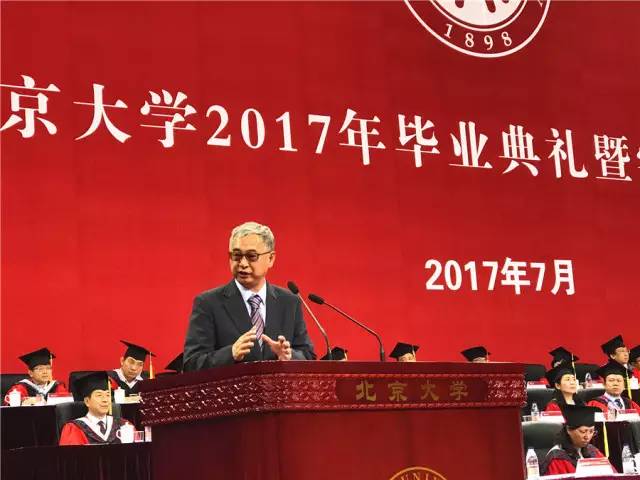隴山隴西郡
寧靜純我心 感得事物人 寫樸實清新. 閑書閑話養閑心,閑筆閑寫記閑人;人生無虞懂珍惜,以沫相濡字字真。|| 推薦到群組
陳寅恪: 水漲船高華山論劍 - 葛兆光, 黃達人, Steven Chu
讀葛兆光北大演講 (below. Ref. 1), 想美國能源部長諾貝爾獎主Steven Chu 哈佛畢業致詞 (Ref. 2),
兩人共同點:,1)個人經曆小故事; (2),引用曆史名人名言為寄望語結題 (His advice was borrowed from the famous)。
中山大學原校長黃達人寫文章講演,常引用他人的說寫,擇編而成。萜剪有主線,把別人說我所用說,匠心獨運,巧奪天功, 天衣無縫!
寫文章必有個人風格。
Steven Chu: "authors who borrow from others are following in the footsteps of the best. Ralph Waldo Emerson, who graduated from Harvard at the age of 18, noted “All my best thoughts were stolen by the ancients.” Picasso declared “Good artists borrow. Great artists steal.” Why should commencement
speakers be held to a higher standard?"“從別人那裏借來的作者正在追求最好的腳步,拉爾夫·沃爾多·艾默生18歲從哈佛大學畢業,他說:”我所有的最好的想法都被古人偷走了“畢加索宣稱”好藝術家借 偉大的藝術家偷了“為什麽要開始演講者要高一些?”
誰來解釋中國”和“如何解釋中國”?
1929年曆史學家陳寅恪給北大曆史係畢業生題詩,其中一首詩前兩句是“群趨東鄰受國史,神州士夫羞欲死”,意思是說,居然一批又一批的人到外國(主要是日本)去學中國史,這讓陳寅恪這樣有尊嚴的中國學者覺得羞愧欲死,他期待中國這種事事不如人的情況,能在年青一代手中改變,所以後兩句說,“田巴魯仲兩無成,要待諸君洗斯恥”。在國際的學術比賽中洗雪恥辱,這是從北京大學畢業的研究生們的責任。
~~~~~~~~~~~~~ Ref. 1 ~~~~~~~~~~~~~~~~~~~~~~~~~~~~~~~~
[轉載]葛兆光北大演講:對中國學術現狀,我並不樂觀
||| 推薦到群組
本文為北京大學2017年研究生畢業典禮校友代表葛兆光發言,首發北京大學校友會(pkuorgcn)。

葛兆光
北京大學的各位同學、各位老師、各位領導、家長們:
今天,一個四十年前進入北大校門的老學生,能夠回到母校,代表校友祝賀四十年後北大研究生畢業,我真是既高興,又榮幸。
如今,你們也許很難體會到“北京大學”這四個字,對於當年的我們,有多重要的意義!記得四十年前的冬天,好像那天是正月十五,我在貴州苗族山區一個小縣城,突然收到印著“北京大學”四個紅字的牛皮紙信袋,知道那是錄取通知書,我沒有拆開,而是跑回家拿給母親,母親拆開信封剛看一眼,向來喜怒不形於色的她竟然會高聲大笑,然後轉過頭去,不讓我們看她淚流滿麵。
現在想起來真是傷感,沒有辦法不傷感。我母親曾經是參加過全國群英會的模範教師,可是那個時候,她的兒子已經28歲,和你們現在博士畢業的年齡差不多,已經“輟學”十幾年。從1966年初中畢業起,我在縣城的街上無所事事地遊蕩,接著下鄉插隊在苗寨做過瓦,為了生計也在貓洞挖過煤,沒有飯吃也在集市上賣過柴。
北大的這份錄取通知書,當然從此改變了我的命運。
可是,在這個典禮上,我要說的,不是我個人命運的改變,我要說的是,直到進了北大之後,我才漸漸感覺到,跨進北大之門,不僅是我個人人生的改變,進了北大,跨入學術世界,也給我們身上,壓了一個沉甸甸的學術責任。
為什麽?因為北大是中國一個最特殊的大學,在它的傳統中,除了五四以來,提倡民主、科學、自由的精神,激發出對中國未來的那份熱情之外,還有一種學術上的追求和責任,這種學術不僅要有自由和開放,也要有嚴謹和規範,而且更要有非常非常高的標準和理想。北大之所以是北大,是因為它聚集了中國一批最好的老師,一批最好的學生,到處臥虎藏龍,如果你不借著這個“水漲船高”的機會,在這裏擴充你的知識、提升你的境界、思考你的問題,你沒法在國際學界“華山論劍”。
在北大,你不僅要看第一等的論著,要做第一等的題目,而且要和第一等的學者過招,然後才能使自己成為第一等的學人。我知道,北大在中國的特殊地位,確實常常給學生以榮耀和自信,但是我要說,隻有北大給你的榮耀和自信,並不能成為第一等的學者。我想告訴大家的是,對中國學術現狀,我並不樂觀,坦率地說,中國在自然科學上能造福整個人類的成果還不多,在社會科學上能被世界普遍運用的典範、理論和方法仍太少,在人文學術領域中,能引起國際廣泛討論的話題也太缺乏,甚至在“誰來解釋中國”和“如何解釋中國”的問題上,我們也不敢有十足的自信。在這裏,我想起的是1929年曆史學家陳寅恪給北大曆史係畢業生題詩,其中一首詩前兩句是“群趨東鄰受國史,神州士夫羞欲死”,意思是說,居然一批又一批的人到外國(主要是日本)去學中國史,這讓陳寅恪這樣有尊嚴的中國學者覺得羞愧欲死,他期待中國這種事事不如人的情況,能在年青一代手中改變,所以後兩句說,“田巴魯仲兩無成,要待諸君洗斯恥”。在國際的學術比賽中洗雪恥辱,這是從北京大學畢業的研究生們的責任。
所以,我一直在說,好的大學不可有精英的傲慢,但要有精英的意識,好的學者不能自視為天下第一,卻不能沒有爭天下第一的雄心。
在北大研究生畢業典禮上,當然會想到北大的前輩傑出學者,可是,如果曆數北大前輩傑出學者,就等於要寫一部中國現代學術史。我沒法一一列舉,在這裏我隻是給各位送上三個北大前輩的話。第一段話,是胡適(1891-1962)說的,“做人要在有疑處不疑,做學問要在不疑處有疑”,後麵這句話是說,在學術研究中,永遠需要勇於懷疑的精神,靠著這種精神,你才能發現死角、看出破綻,提出超越前人的真問題;第二段話,是傅斯年(1896-1950)說的,“上窮碧落下黃泉,動手動腳找東西”,沒有尋找再尋找(search and research)的吃苦精神,沒有紮實的知識基礎,你是不能成功的,學問不能靠小聰明,因為“羅馬不是一天建成的”;第三段話,是顧頡剛(1893-1980)說的,“學問上是沒有止境的,如果得到了止境就等於自己的墮落”,因為在學術研究這一行,比的常常是馬拉鬆,而不是百米,不能堅持就沒有收獲,千萬不要自我滿足,別滿足於SCI SSCI AHCI的數量,把平庸的小土坡,當作“會當淩絕頂,一覽眾山小”的泰山。
在學問的追求上,你要知道“天外有天”。
各位研究生同學們,你們很快要走出校門了,等待你們的明天會怎麽樣?
我不願意給你們一個幻覺和假象,好像從北大校門走出去,頂著北大這麵招牌,就一定會前程似錦,光明燦爛。我建議你們把困難想得多一點,武俠小說裏麵常說一句話,叫“未料勝,先料敗”,在通向未來的路上,可能還會有好多好多困難。
無論有沒有圍牆,無論還有多少缺陷,在研究生時代學校都像一個家,還算一個溫暖的地方,在這裏的幾年你可以定下心來讀書,一直到很多年以後,你一定還會想起學校的宿舍、學校的圖書館,學校的老師和同學。可是,現在你要離開校門了,外麵的世界,雖然很精彩,充滿了無限的可能性,但是卻有疾風暴雨、暗礁險灘,你不能不睜大眼睛枕戈待旦。我想,也許走出校門你們才會看到,如今這個時代還很讓人困惑,無論是個人、國家還是世界,好像都處在變動之中,未來都還有些混沌不明,往前走的路還很崎嶇,還需要艱難地摸索。
正是在這個時候,你們即將走出校門走向世界。走向世界?這讓我想到北大另一位老前輩梁漱溟(1893-1988),整整一百年前的1918年,他父親在對世界絕望中選擇自殺,在自殺前曾經問他“這個世界會好嗎?”很多年後,一個美國芝加哥大學的教授艾愷,在編梁漱溟晚年口述時,又用這句話當作書名《這個世界會好嗎》。
現在,這個問題又出現在你們麵前。“這個世界會好嗎”?應該由你們來回答,你們還年輕,有足夠的時間和足夠的智慧,我真心希望,你們會給我們一個光明的答案。
謝謝。
轉載本文請聯係原作者獲取授權,同時請注明本文來自蔣永華科學網博客。
鏈接地址:http://blog.sciencenet.cn/blog-39946-1064968.html
上一篇:[轉載]他撿起了老本行:為中國地質大學實習的學生作地質講座
~~
主要研究領域為古代中國的宗教史和思想史。曆史學,專門史及曆史文獻學。
http://baike.baidu.com/item/%E8%91%9B%E5%85%86%E5%85%89
~~~~~~~~~~~ Ref. 2 ~~~~~~~~~~~~~~~~~~~~~~~~~
U.S. Energy Secretary Steven Chu's address at Harvard's Afternoon ...
Commencement Address | Harvard Gazette
Harvard Commencement 2009 - YouTube
Personal story:
"I am grateful to receive an honorary degree from Harvard, an honor that means more to me than you might care to imagine. You see, I was the academic black sheep of my family. My older brother has an M.D./Ph.D. from MIT and Harvard while my younger brother has a law degree from Harvard. When I was awarded a Nobel Prize, I thought my mother would be pleased. Not so. When I called her on the morning of the announcement, she replied, “That’s nice, but when are you going to visit me next? Now, as the last brother with a degree from Harvard, maybe, at last, she will be satisfied."
His advice was borrowed from the famous:
"Second, authors who borrow from others are following in the footsteps of the best. Ralph Waldo Emerson, who graduated from Harvard at the age of 18, noted “All my best thoughts were stolen by the ancients.” Picasso declared “Good artists borrow. Great artists steal.” Why should commencement speakers be held to a higher standard?"
"As Oscar Wilde said, “The only thing to do with good advice is to pass it on. It is never of any use to oneself.”?So, here comes the advice.?First, every time you celebrate an achievement, be thankful to those who made it possible. Thank your parents and friends who supported you, thank your professors who were inspirational, and especially thank the other professors whose less-than-brilliant lectures forced you to teach yourself. Going forward, the ability to teach yourself is the hallmark of a great liberal arts education and will be the key to your success. To your fellow students who have added immeasurably to your education during those late night discussions, hug them. Also, of course, thank Harvard. Should you forget, there’s an alumni association to remind you.?Second, in your future life, cultivate a generous spirit. In all negotiations, don’t bargain for the last, little advantage. Leave the change on the table. In your collaborations, always remember that “credit” is not a conserved quantity. In a successful collaboration, everybody gets 90 percent of the credit.
Jimmy Stewart, as Elwood P. Dowd in the movie “Harvey” got it exactly right. He said: “Years ago my mother used to say to me, ‘In this world, Elwood, you must be … she always used to call me Elwood … in this world, Elwood, you must be oh so smart or oh so pleasant.’” Well, for years I was smart. … I recommend pleasant. You may quote me on that.
My third piece of advice is as follows: As you begin this new stage of your lives, follow your passion. If you don’t have a passion, don’t be satisfied until you find one. Life is too short to go through it without caring deeply about something. When I was your age, I was incredibly single-minded in my goal to be a physicist. After college, I spent eight years as a graduate student and postdoc at Berkeley, and then nine years at Bell Labs. During that my time, my central focus and professional joy was physics.
Here is my final piece of advice. Pursuing a personal passion is important, but it should not be your only goal. When you are old and gray, and look back on your life, you will want to be proud of what you have done. The source of that pride won’t be the things you have acquired or the recognition you have received. It will be the lives you have touched and the difference you have made."
Nobel laureate William Faulkner:
“I believe that man will not merely endure: he will prevail. He is immortal, not because he alone among creatures has an inexhaustible voice, but because he has a soul, a spirit capable of compassion and sacrifice and endurance. The poet’s, the writer’s, duty is to write about these things. It is his privilege to help man endure by lifting his heart, by reminding him of the courage and honor and hope and pride and compassion and pity and sacrifice which have been the glory of his past.”“我相信人不會忍受:他將勝利。 他是不朽的,不是因為他一個人在生物之間有一個取之不盡的聲音,而是因為他有一個靈魂,能夠同情,犧牲和忍耐的精神。詩人,作家的職責是寫這些東西。他的榮幸是通過提升他的心靈來幫助人忍受,提醒他過往的榮耀的勇氣和榮幸,希望,驕傲和同情,憐憫和犧牲。“
http://blog.sciencenet.cn/blog-847277-1065006.html
上一篇:人常常不是死於疾病,而是死於過度治療/過度診斷?






